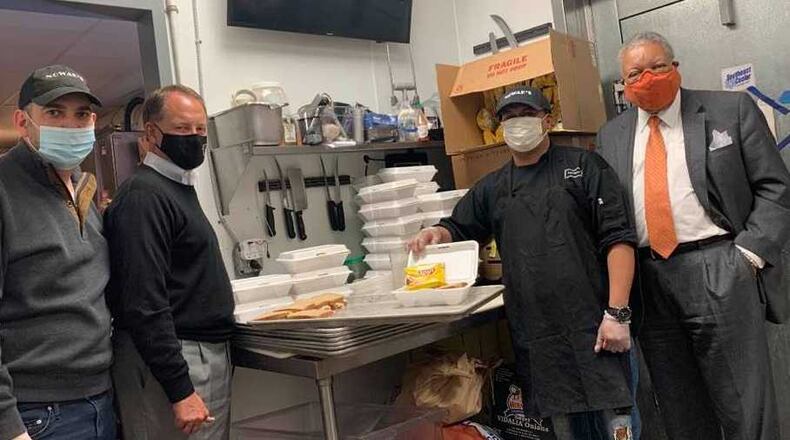Fulton County’s tentative plan of how to spend its $104 million in federal emergency COVID-19 funds includes everything from tens of millions on a jail isolation unit to half a million to feed children.
Five metro area governments — the city of Atlanta and the counties of Cobb, DeKalb, Gwinnett and Fulton — were told three weeks ago month they would receive more than $600 million of money from the CARES Act. They have all been left with the fraught task of figuring out how to use the money.
Fulton met the population requirement for CARES dollars, which required localities have more than 500,000 residents. The only city in Fulton large enough to get its own slice was Atlanta, leaving the other 14 cities in Fulton in a pool with every other Georgia locality asking the state for some of its share. Some mayors didn't like that and asked for half, but the county's chairman said no.
Fulton officials have said they will try to keep the entire response close to the $104 million because the county is facing unknown financial burden. Governments around the country are expecting serious hits to their commercial property tax base, meaning less money into governments responding to a crisis.
The $104 million will be broken into three blocks, with $7 million reserved in case of a second wave of the virus, according to a presentation from staff to county commissioners at a meeting last week.
READ | Metro counties begin fraught task of spending federal coronavirus aid
One block is about $37 million set to keep the county afloat, with about $25 million of that going toward personal protective equipment (PPE) and supplies.
Another block is roughly $50 million for the health response — about half of that has been set aside for a jail COVID-19 isolation unit.
County manager Dick Anderson told the AJC on Tuesday that the county’s main jail on Rice Street has avoided an outbreak. There have been 30 confirmed cases and no deaths, according to the county. But Fulton wants the jail prepared should they need to isolate inmates with the virus.
The pre-fabricated units would add 96 beds to the Rice Street jail for men and 24 beds to the Union City jail for women, he said. Anderson added that the units could be sterilized once a patient has left by removing all the air from the room.
Credit: Elijah Nouvelage
Credit: Elijah Nouvelage
Alton Adams, Fulton’s deputy chief operating officer in charge of public safety, told commissioners last week he the units ready by the start of September in case of a second wave of coronavirus.
The county jail has needed more space for a while. An inmate's handwritten complaint triggered 11 years of federal oversight at the jail, where there were complaints of overcrowding, raw sewage flooding cells and inmates left to wander because of faulty locks. But this is different, Anderson said.
“COVID presents a unique challenge to the jail. It’s not just an overcrowding issue,” he said, “it’s a health issue and ultimately a life-and-death issue.”
Anderson said he plans to bring one bidder before the Board of Commissioners at its meeting Wednesday.
READ | Cities want half of Fulton's $104M to fight COVID-19; county says no
The third block of money is the $10 million the Board allotted in early April for community response. One of the programs funded by that money began Monday.
Chairman Robb Pitts told the AJC on Tuesday he had an idea to help struggling families and businesses with one move. Fulton is paying six restaurants a total of $450,000 to feed 300 children and 75 families living in extended-stay motels.
When schools buildings closed March 12 due to the virus, many low-income students lost their only steady meal of the day. Though Fulton County Schools gave out more than 30,000 meals in just its first two days of meal service and has continued to provide meals, many families in extended-stays don't have a way to get to the sites, Pitts said. As part of the contract, the six restaurants must deliver two meals a day for a month.
One of them is Gocha’s Breakfast Bar, which Gocha Hawkins opened on Cascade Road about a year and a half ago.
She said the county is paying her $57,600 to cook and deliver lunches and dinners — like beef tips with gravy and vegetables, lasagna and quiche — to 120 children in four motels on the Southside.
Before the pandemic, she had 41 employees. When business basically disappeared overnight, she cut it down to her and six other staff. She said she’s able to hire back four employees with the money from the county.
“We should be able to make it for the next three months” because of the contract, she said.
Meals cost the county $12 and they cost Hawkins roughly $8, depending on the ingredients.
When asked how business is doing, she said: “It’s OK. It’s nothing considering when we were open, but it’s keeping our lights on.”
The other five restaurants given contracts are: Nowak’s, Goldberg’s Bagel Company & Deli, Gio’s Chicken Amalfitano, Big Daddy’s and Sandtown Pub.
Like North Fulton County News Now on Facebook | Follow us on Twitter
About the Author
Keep Reading
The Latest
Featured




